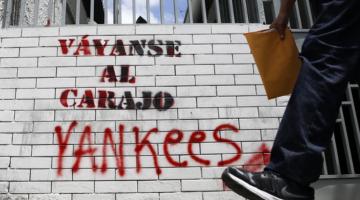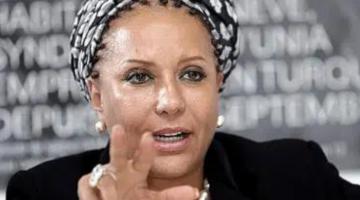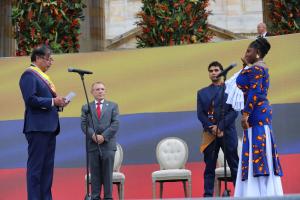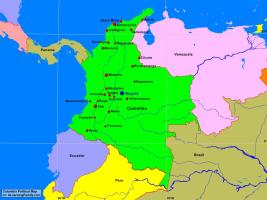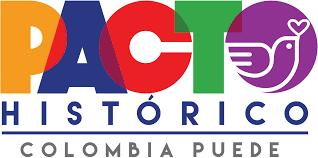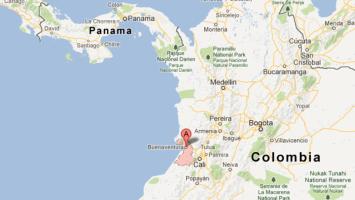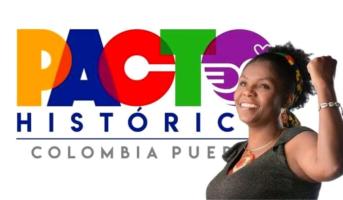Before Colombia’s national uprising exploded in April 2021, struggles for justice in a majority Black port city set in motion a historic new wave of social protest.
In 2017, Junior Jein, a rapper from Buenaventura [Colombia], released a song that became the anthem of a protest. But he did not appear in the music video. Instead, karaoke-style lyrics play alongside a CGI television set that shows clips of police motorcades patrolling the city, cops raiding neighborhoods, and children choking on tear gas. In the background, a steady fire burns through a chain link fence bordered by the yellow and green flags of Buenaventura.
The chorus repeats: “ESMAD, fucking ESMAD. Esa es la respuesta que el gobierno nos da.” ESMAD, that’s the response that the government gives us.
Junior Jein’s song, aptly named “Fucking ESMAD,” goes on to describe the conditions of state violence in the city: “If we ask for water, they send us ESMAD. If we ask for education, they send us ESMAD. If we ask for healthcare, they send us ESMAD.”
ESMAD, of course, is not a benevolent government agency that can provide those things — it is the acronym for the riot police, or the Mobile Anti-Disturbance Squad. Calls to disband the notorious force have grown, particularly in the wake of deadly crackdowns on national uprisings in recent years.
Beyond condemning ESMAD, Junior Jein’s song and accompanying music video express a collective frustration in the majority Black city of Buenaventura: the state, and by extension the police, guards the economic interests of a private few while systematically denying socioeconomic justice for the city’s impoverished population. When the people make demands, they face brutal repression.
In 2017, the Civic Strike, or Paro Cívico, in Buenaventura shut down Colombia’s most important international port for 22 days. The protest gave birth to the song by Junior Jein and — together with a simultaneous Civic Strike in the neighboring department of Chocó — marked the onset of a new cycle of social protest in Colombia. As one of the first major protests following the 2016 Peace Accords and certainly the most confrontational at that point, the Civic Strike in Buenaventura demonstrated the limits to neoliberal “peace.”
Neoliberal peace — if it can be called peace at all — reflects the state’s commitment to protecting the flow of capital. In Buenaventura and throughout much of Colombia’s Pacific coast, neoliberal peace corresponds to what Ruth Wilson Gilmore and David Harvey have called “organized abandonment.” That is to say that Buenaventura’s problems do not reside in the absence of the state, per se. Rather, the state’s presence materializes in the promotion and protection of the neoliberal economic model through investment in large-scale infrastructure and agricultural projects along with militarization to protect private economic interests. Even in its multicultural guise that supposedly affirms the rights of Black and Indigenous peoples, neoliberal peace remains firmly invested in racial capitalism.
For example, the Colombian government pledged more than $15 million in the last few years to renovate the infrastructure of the privatized port, and the nearby Málaga Naval Base operates with state-of-the-art weaponry. Meanwhile, Buenaventura’s unemployment rate was 33.6 percent in 2020, which does not include the underemployed and informal working population. Additionally, the people still live under the threat of violence as armed groups — such as paramilitaries, drug traf- fickers, organized crime syndicates, the military, and guerrillas — attempt to assert territorial control to secure their economic interests. Despite the 2018 election of a mayor that came out of the movement that organized the Civic Strike, these conditions persist.
Returning to the lessons from the 2017 Civic Strike and its aftermath is fundamental to understanding the current conditions of struggle in Buenaventura and throughout Colombia.
2017 Civic Strike Struggles for Autonomy
Although former President Juan Manuel Santos attempted to project a rosy image to the rest of the world as he approached the last year of his presidency, peace and prosperity felt more distant than ever in Buenaventura. Amid the 2017 protests, the police beat down Black people demanding access to clean water.
Between May 16 and June 6, 2017, tens of thou- sands of people poured into the city’s streets. The strikers protested the neoliberal economic policies and structural racism that had left a city of over 400,000 people, where nine out of 10 people are Black, without access to basic public services. At the time of the Civic Strike, 64 percent of the popula- tion lived in poverty, and the sewage system covered only 60 percent of the city. Most of the population received running water in their homes for only a few hours a day and in some communities only a couple of times a week. The privatization of the port in 1991 had contributed to a rise in unemployment such that by 2017, 62 percent of the working age population was unemployed or worked in the infor- mal sector. Meanwhile, the vast majority of capital generated in Buenaventura was diverted into the pockets of the predominantly white business owners from outside of the city and in many cases outside of the country.
The Buenaventura Civic Strike Committee for Life with Dignity and Peace in the Territory had prepared for the mobilization for years and drew from a long history of resistance. The city has long served as a hub for social movements fighting for autonomy and self-determination along Colombia’s Pacific coast, and the 2017 Civic Strike Committee brought together a diversity of organizations and communities — Afrodescendant and Indigenous peoples’ organizations, young people’s organizations, student movements, religious groups, and women’s organizations — with the shared goal of defending the rights, lives, and dignity of the people of Buenaventura.
The strikers set up meeting points at critical sites around the city with open-air tents and sound systems. In addition to providing a space for protesters to converge around music, singing, dancing, storytelling, and chanting for fundamental human rights, these meeting points — like the “resistance points” established during the 2021 uprising in Cali — had another function: preventing cargo trucks from entering or leaving the city. By blockading the only two roads connecting the port to the country’s interior, the protesters forced the government to negotiate. They also risked arrest, beatings, or worse.
The strikers called upon the government to declare a State of Social, Economic, and Ecological Emergency in accordance with Article 215 of the 1991 Constitution. This would provide the state with a framework for allocating urgently needed resources to address specific demands regarding health, access to water, education, culture, sports and recreation, sanitation, access to justice and reparations for victims of the armed conflict, territorial rights, and the local economy. Over the course of the strike, the Civic Strike Committee engaged in public negotiations — broadcasted live on local television — with national and regional government representatives while the people continued to hold down direct action in the streets.
Ultimately, on the morning of June 6, the Civic Strike Committee and the government reached an agreement. The accord included 177 specific agree- ments and the creation of an autonomous Fund for the Development of the Special District of Buenaventura (FonBuenaventura). The fund, financed by international financial institutions, international development agencies, and government funding, including taxes from the businesses profiting from the port, was supposed to sponsor a 10-year comprehensive development plan, extendable to 20 years. In theory, FonBuenaventura was created to address the demands of the Civic Strike and ensure community participation in implementation.
Stuck in Bureaucracy
After the Civic Strike concluded, the resistance movement in Buenaventura struggled to ensure the implementation of the agreements. The Civic Strike Committee had attempted to include safeguards within the deal based on their previous experiences with the government failing to fulfill its obligations. These measures included the formation of the FonBuenaventura, as well as other technocratic fixes aimed at preventing noncompliance. Certain sectors within the movement argued that the obvious next step was to engage in electoral politics and win the mayor’s seat.
Ultimately, Victor Vidal — a longtime activist asso- ciated with the Black Communities’ Process (PCN) social movement and the Civic Strike Committee — won the 2019 mayoral election despite facing intense opposition from the established political and economic elites.
One of the principal obstacles for the Civic Strike Committee — and now the mayor’s office — has been to transform the extractive relationship between the Colombian state and the people of Buenaventura. Vidal’s election seemed to set a hopeful precedent for altering the historical subordination of the Pacific region, and the new administration promised to dis- rupt the status quo.
Four years after the Civic Strike and two years after Vidal’s election, however, the neoliberal state has demonstrated its ability to metabolize resistance. During a September 2021 interview on the El Ágora program, the spokesperson for the Civic Strike Social Movement’s executive committee, Father John Reina, confirmed that only 17 percent of the agreements that should have been implemented by December 31, 2019 have been fulfilled and that the formulation of the special development plan is just beginning, even though it should already be in the implementation phase. Additionally, according to one of the members of the technical team in charge of formulating the plan, “while the government committed 1.6 trillion pesos [about $425 million] to implement projects it identified as urgent, there have barely been advances.” Even the issue of access to water, which was at the heart of the 2017 protests, remains unresolved. While many of the leaders of the Civic Strike Committee are caught in a cycle of endless meetings regarding “community participation” and “implementation,” the mayor confronts an increasingly frustrated public.
From “Organized Abandonment” to Self-Determination
Junior Jein garnered attention again while taking part in the 2021 uprising. Protests over a controversial tax hike in April swiftly morphed into a broad revolt against long-standing injustices and faced a harsh crackdown. In a widely shared video, Junior Jein spoke out against violent police repression. “Hunger doesn’t ease, the press deceives me, the government raids me. Save my country,” he rapped while standing on the Pan-American Highway near the town of Jamundí on the outskirts of Cali. “My only weapon is to protest in the marches. And like Nico Guerrero, the police kill me.” Nicolás Guerrero, an artist from Cali, was shot in the head on May 2 while attending a candlelit vigil for victims of police brutality. According to the Institute for Development and Peace Studies (Indepaz), state forces are presumed to be responsible for 46 of 70 killings that took place during demonstrations between April and June 2021.On June 14, amid the ongoing protests, Junior Jein was tragically murdered outside of a nightclub in Cali. Beyond the unresolved details of the case, Junior Jein’s death drew further attention to already developing discussions around racist and disproportionate state violence against young Black people during the protests. The predominantly Black neighborhoods of eastern Cali — which are also home to Afrodescendants forcibly displaced from Buenaventura and the Pacific coast — became some of the most important “resistance points” during the protests. Like Buenaventura, these neighborhoods also expressed a collective desire to transcend the conditions of “organized abandonment” whereby the state’s presence has historically been limited to repressive policing.
Despite these clear connections between the 2017 Civic Strike and the 2021 uprisings in Colombia, the lessons from Buenaventura have largely been left out of the national narrative of resistance in another example of systemic racism in the country. However, the escalating intensity of the protests in Colombia since the Civic Strike corresponds with a growing awareness of the intransigence and irreconcilable inhumanity of the neoliberal state — and this awareness manifested in the messages of Junior Jein’s lyrics and images of the blockades during the 2017 Civic Strike.
The 2017 Civic Strike of Buenaventura was a piv- otal moment for social protest in the country. The violent suppression by the ESMAD further exposed the truth behind the state’s empty rhetoric of peace, and — by effectively halting the flow of capital at one of Latin America’s most important ports — the Civic Strike demonstrated the enduring power of people to confront oppression. Nevertheless, the Civic Strike Committee and the mayor now face fierce struc- tural challenges to delivering on their promises, and the people of Buenaventura are getting more impatient with dead-end bureaucratic processes and representatives that seem incapable of producing real change. Movements around the country are facing similar challenges. As the uprisings in 2020 and 2021 indicate, this crisis of institutional legitimacy sparks evermore disaffected forms of resistance demanding transformations in Buenaventura and beyond.
Harrinson Cuero Campaz is an Afro-Colombian rights activist, PhD candidate, and social leader. He is also a member of the Black Communities Process (PCN) focused on defending collective rights, identity, territory, and self- governance in Colombia.
Anthony Dest is Assistant Professor of Anthropology at Lehman College.
Esther Ojulari is the Buenaventura Regional Coordinator for the Consultoría para los Derechos Humanos y el Desplazamiento (CODHES), as well as a member of the International Coalition of People of African Descent (ICPAD) and the Black Alliance for Peace (BAP) International Committee.

